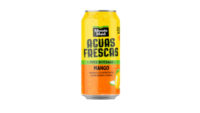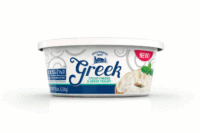Franklin Foods wants to make cream cheese new again

Franklin Foods executives (from left): Rocco Cardinale, John Ovitt, Jon Gutknecht, Jill Gutknecht and Brian Ledding. 2015 photo for Dairy Foods by Vito Palmisano.







Cream cheese manufacturer Franklin Foods is on a mission to reinvent cream cheese. The company produces for retail, foodservice and private label and is currently the third-largest cream cheese producer and second-largest private label cream cheese manufacturer in the United States, according to the company. It’s been in business and making dairy products for more than 100 years. And while retail sales of the category are dropping, the company is seeing exceptional growth, about 15% annually for the past 10 years. Last year, Franklin’s revenue reached $110 million. It was $93 million in 2013 and $80 million in 2012.
Partner and CEO/President Jon Gutknecht called Franklin Foods a private label company. Its output is 40% branded and 60% private label and it also does co-packing. Its customers are retail, retail private label, foodservice, industrial ingredients, custom applications and export.
“We are in every channel there is,” said Gutknecht, “Our foodservice side is growing rapidly and dramatically.”
The company, which is a member of both the International Dairy Deli Bakery Association and the International Dairy Foods Association, is Safe Quality Foods Level 3-certified with a headquarters in Delray Beach, Fla., a plant in Enosburg Falls, Vt., and its newest plant in Casa Grande, Ariz., which opened in 2013. Because of its growth, particularly with Greek cream cheese, the new plant has already surpassed the production level of its Vermont location. (Read more about the Arizona plant) The headquarters resides in Florida because of the ease of travel throughout the United States, and its close proximity to the company’s key customers (Gutknecht also lives in Florida). The company employs 125 full-time and 25 part-time people between all three locations.
A new cream cheese message
When it comes to “reinventing cream cheese,” Gutknecht said it’s more about changing the cream cheese message.
“Cream cheese has gotten very old. I don’t say this in a negative way, but as our consumers have aged, the younger generation has not picked up with the same voracity [of] consumption,” he said.
The goal, as he put it, is to make cream cheese “more relevant for today’s consumers.”
The company has several ideas on how to do this, Gutknecht said, starting with its Greek line, the industry’s first Greek cream cheese (made with Greek yogurt), which focuses on protein. The protein message is emphasized on the front of the packaging of 8-ounce bar, boldly claiming “four times more protein and less than half the fat of regular cream cheese.” Each 2 tablespoon serving has 4 grams of protein and 3 grams of fat.
Protein is an important message right now, Gutknecht said.
“I’m thrilled that the dairy industry is now promoting protein. I think it’s been a long time coming,” he said. “As the industry collectively focuses on milk’s functional benefits, all dairy participants will benefit.”
Beyond its Greek line, the company is working on launching several innovations for healthy snacking and refueling, with a target audience that includes Millennials.
With competition that includes big names like Kraft and Schreiber Foods, Franklin Foods maintains its competitive edge “by being flexible and responsive,” said Rocco Cardinale, vice president of marketing. “The goal is to act like a hungry, entrepreneurial small company, no matter now large our sales and volume grows.”
Gutknecht added, “We’ve grown dramatically, but for us our share is such that it’s easy to expand share just through innovation, but also geographic because of our footprint. Now that we’re [in Arizona], I would say most of our sales growth is coming out of the Western U.S. right now and export. Export is really taking off.”
Gutknecht emphasized the “flatness” of the company and how important it is that they make themselves very accessible to every customer.
“We avoid a bureaucratic structure to ensure our entire organization is nimble and responsive to our customers’ needs. We insist on swift responses to customer inquiries and empower our entire organization to make decisions,” he said “Our goal is to never have a customer trapped in endless voicemail or emails.”
He continued, “We’ve grown very large and we’re getting to be a big company, but in sales, when people call, they’ll have an answer often times in 30 to 40 minutes. We don’t have to go to a whole committee. You will not have to wait for an answer.”
This customer-oriented, hands-on approach filters throughout the company. Gutknecht said they really believe in empowering their people. He described the company not only as very hands on, but “very, very quality minded.” In fact, on the day Dairy Foods visited its Arizona plant, the company had another SQF audit that morning and it achieved SQF level 3 again, with a score of 96, which Gutknecht described as remarkable.
Greek cream cheese success
The company’s product lines consist of cultured cream cheese, cream cheese, baker’s cheese, Mascarpone, flavored dips and spreads, Baking Cheeze Blend (a cream cheese alternative blend), reduced-fat, Neufchatel cheese, whipped cream cheese, organic cream cheese, yogurt and cream cheese, and Greek cream cheese. The products are available in a variety of sizes, from 1-ounce portion cups and 8-ounce bars and cups to 3-pound bars, 5-pound tubs and 30-pound boxes.
The company’s Green Mountain Farms brand Greek cream cheese is available nationally in Walmart and other key retailers across the United States. It also manufactures Greek cream cheese for Kroger that’s available at 2,400 stores across 31 states.
Most of the company’s brands are available for both foodservice and retail (nationally and internationally), with customers that include supermarkets, club stores, c-stores and schools/universities. Its current foodservice lines are Hahn’s Baker’s Cheese, Hahn’s (which includes direct-set cream cheese), Green Mountain Farms, Lombardi’s, All Season’s Kitchen, Casa Grande Farms (a new brand), and Green Mountain Farms Greek cream cheese & yogurt.
The company’s retail brands are the Green Mountain Farms Greek cream cheese, Hahn’s cream cheese and flavored spreads (available nationally and internationally); Green Mountain Farms spreads and dips; and Casa Grande Farms cream cheese and dips (available regionally).
As mentioned, helping to drive growth is the Greek cream cheese, which is marketed through supermarkets, club stores and foodservice.
According to the USDA’s National Agriculture Statistics Service, cream cheese production in the United States increased 14% from 744.8 million pounds in 2010 to 851.7 million pounds in 2014. But current sales at retail don’t reflect this bullishness in production. The overall cream cheese category saw units drop 2.2%, according to Information Resources Inc., Chicago, for the 52 weeks ended Jan. 25, 2015.
Gutknecht said its customers that stocked Greek cream cheese in 2014 experienced growth in cream cheese sales, those that didn’t saw flat or a decline in sales. The company’s Green Mountain Farms brand saw unit sales jump 59.3% in the whipped cream cheese segment, according IRI.
Also driving growth is its Baking Cheeze Blend, marketed through foodservice and industrial/ingredients.
The Baking Cheeze Blend is “a new product that we started doing just a couple years back. I guess you’d call it an analogue cheese,” said Gutknecht. “It’s a blend of dairy-based and plant-based oils. It’s the same fat content as cream cheese but it’s a way to hold the cost down when dairy prices go crazy. A lot of our customers spec it for all types of industrial applications and uses.”
Baking Cheeze Blend is not to be confused with Baker’s Cheese, which the company has been making since its beginning. According to Cardinale, Baker’s Cheese is a soft cheese, a little tart, with a chalky taste. It’s not consumed in its natural state and is used strictly an ingredient. It’s desirable because it’s used as non-fat replacement, and it is high-protein, which is ideal in a variety of applications.
“Franklin is a leading commercial manufacturer of Baker’s Cheese in the U.S., and the last manufacturer to make it in the traditional artisan-style without mechanical separation,” said Cardinale. “The cheese mixture is pumped into cheesecloth bags, hung on a hook conveyor system and left to naturally drain overnight. Bakers Cheese is then pressed to obtain its desired moisture and then packaged into 30-pound boxes.”
An innovative history
Gutknecht said that what makes the company unique is it is entirely focused on making cream cheese (and always has been), and the products are handcrafted. The company prepares all of its ingredients by hand.
“We actually began making cream cheese as direct-set cream cheese…we call it the Starbucks of cream cheese. It has a real bite to it but the whey stays in so it has more protein,” he said. “It’s made through an acidification process where you actually keep all the whey in and it takes about 45 minutes to make. Whereas when you make traditional cultured cream cheese, which we do now, it can take anywhere from 10 to 12 hours because the cultures have to eat themselves, eat the curd to a stage and build the curd that way. Whereas in direct-set the acids are applied and it forms immediately.”
The company only started making cultured cream cheese about nine years ago. Gutknecht said they are applying a lot of the technologies used from its direct-set into what it does for the Greek cream cheese and other new brands.
“It really gives a distinctive taste,” he said.
The company has several awards under its belt to back this up. Among others, the Green Mountain Farms Tzatziki Savory Yogurt Dips took first place (Best of Class) in Flavored Spreadable Cheese at the 2013 United States Championship Cheese Contest. Green Mountain Farms Cultured Cream Cheese took first place in the Cheeses Made from Cow’s Milk category at the 2012 American Cheese Society Competition, along with Hahn’s Cultured Cream Cheese in third place for the same category. Green Mountain Farms Greek Spreadable Cheese was voted one of the 10 Best New Dairy Products of 2013 in a Dairy Foods poll.
The company was started in 1899 by partners Frank Hahn and Russ Rustelhulse in Enosburg Falls, Vt. It was known as the Hahn’s Cheese Co. at that time. Its primary product, Baker’s Cheese, was popular in the New York City baking market. The quality and old-world techniques created a desirable product for the city’s New York-style cheesecakes. In the 1940s, Otto Hildebrandt purchased the company in order to vertically integrate his bakery supply company, which distributed products like eggs, milk and cream to retail bakeries in the New York City area.
In the 1950s, the company moved operations to Vermont to the east end of the old 1908 United Farmer’s plant (the present-day home of Franklin Foods’ factory). Otto’s son Walter Hildebrandt began leading the company and pursued growth through the development of direct-set cream cheese in the 1970s. This new process allowed for the creation of premium cream cheese using a faster process that does not create whey. It had the smooth texture of traditional cream cheese but a tangy taste.
In 1989, Hildebrandt sold the company to Nordahl Brue and Michael Dressell, who were fans of direct-set cream cheese. As the founders of Bruegger’s Bagel Bakeries, Brue and Dressell wanted to branch out into flavored cream cheese for their bagel stores. In 1990, the first Bruegger’s brand flavored cream was created. (Bruegger’s remains a customer of Franklin’s to this day.) The company went on to make several major plant renovations and added the All Seasons Kitchen line.
Today, Brue and Dressell are board members, but are not involved in day-to-day operations. Franklin Foods continues to operate in the facility where the business was originally relocated. The building has been renovated and old structures removed, but the east wing from the original building, which Hildebrandt first rented to make cheese, still remains.
Gutknecht joined the company in 1999 and is now a partner in the business. Under his leadership the company began to change rapidly, with changes in production and management as well as a new push for innovation. In 2000, the Vermont Gourmet line of cream cheese was created and a new company name was adopted — Franklin Foods. Technological advances in 2003 allowed for the creation of the first-ever yogurt cream cheese. The product was named Hahn’s Yogurt and Cream Cheese, honoring the century-old tradition that made the company what it is.
When Dairy Foods sat down to speak with several members of the management staff, the admiration among the group for each other was clear. Gutknecht boasted about his team, who has a long history in dairy.
John Ovitt, vice president of operations and general manager for both plants, came from the farm, “so he knows cheese from the cow all the way through,” said Gutknecht. Plant Manager Brian Ledding has a history with other dairy companies, and everybody on its sales team is from dairy companies, and is very versed, he said.
“The key in the whole thing is that Jon drove us,” said John Ovitt, vice president and general manager, while Cardinale indicated Jon was being modest.
“That’s basically why the growth happened, it’s because you pushed us,” Ovitt said.
“We do it as a group,” said Gutknecht.
With its success, the company has found ways to give back to the community as well. It makes donations to American Heart Walk and the Race for the Cure Walks. Franklin Foods is part of the Young Cooperators, a program organized by the National Milk Producers Federation to educate and build leadership ability in young dairy farmers. In Arizona, it’s also involved with Pinal40, a non-profit led by dairyman Dennis Dugan of Triple D Dairy, Casa Grande, Ariz. Pinal40 is a fraternity of community members from Pinal County who work to promote and develop youth with an emphasis on farming and agriculture.
What the future holds
The company has a very ambitious five- year plan that focuses on numerous new product innovations and compound sales growth exceeding 15% annually.
This goal includes expanding the market for its Greek cream cheese internationally, and adding new product extensions in its Greek offerings this year, like the healthy snacking and refueling innovations mentioned earlier. Part of its focus is targeting Millennials.
Gutknecht said their focus is switching a bit. The plan is still to continue with private label because that’s the foundation and the company will never stop doing that. But moving forward, the plan is to get into more branding. Greek was the start of that, and there are more products to be released soon, he said.
Export is also a big focus for the company. Its export side was started 10 years ago and is currently about 5% of the business. Jon’s wife, Jill Gutknecht, handles this side of the business as export sales manager. In the last two years, export has really taken off for the company.
Jill Gutknecht said the “leads are crazy” and things are moving fast.
“Export is on track to double in 2015. We continue to accelerate our foodservice and industrial-size export sales. We are now moving very swiftly into the retail side of export with new business throughout Asia, South America and Mexico,” said Jon Gutknecht.
With exports building, and the company dedicated to creating a new conversation around cream cheese, the future looks promising for this dairy product. If Franklin Foods has anything to say about it, it will be.
Looking for a reprint of this article?
From high-res PDFs to custom plaques, order your copy today!










